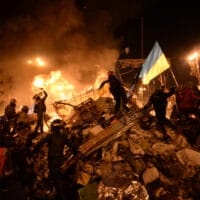-
György Lukács facts for kids
This page is about the philosopher. The native form of this personal name is Lukács György.
-
U.S. invites authoritarian far-right regimes to ‘Summit for Democracy’
The Joe Biden administration invited numerous authoritarian far-right leaders to the U.S. State Department’s so-called “Summit for Democracy”, including Israel’s Benjamin Netanyahu, Poland’s Andrzej Duda, India’s Narendra Modi, Italy’s Giorgia Meloni, and Pakistan’s coup regime.
-
Russia and the Ukraine crisis: The Eurasian Project in conflict with the triad imperialist policies
We wanted to draw readers attention to this piece by Samir Amin, which was written at the time of the Maidan Coup in 2014. —Eds. 1. The current global stage is dominated by the attempt of historical centers of imperialism (the U.S., Western and Central Europe, Japan—hereafter called “the Triad”) to maintain their exclusive control […]
-
Non-capitalist mixed economies: what makes a socialist?
In this paper I attempt to provide a short overview of the subject. Words like democracy, freedom, anarchist, Marxist, communist are used in so many different meanings that they become meaningless. One such word is “socialist.” – László Tütő
-
“In Hungary, there is no way forward but strikes”
Guzslován Gábor of the Federation of Metal Workers Union of Hungary talks about the impact of the ‘slave law’ passed by the far-right government of Viktor Orbán and the massive protests against it.
-
Hungarians hit the street against ‘slave law’ that increases overtime
According to the new provision that was passed on Wednesday, employers can demand as much as 400 hours of overtime a year and can take three years to disburse the payments for the same.
-
Istvan Meszaros and Marx’s theory of alienation
The late Hungarian philosopher explained how alienation can only be overcome by collective action which challenges capitalist relations of production.
-
The rule of the market in East-Central Europe is absolute
Nobody can say that liberal democracy has not liberated some people and that some kinds of servitude have not been obliterated. But the current system has run into a number of contradictions.
-
Berlin: An Omen for the 2017 German Federal Elections?
There is currently too much dramatic news abroad in the world, mostly bad. What can an election in one single city mean, far from most fronts? Yet the voting in Berlin last Sunday (September 18th) was full of drama and meaning, also outside Germany. The results caused some to grieve, some to applaud, and analysts […]
-
Turkey: A War of Two Coups
On the night of 15-16 July, Turkey went through a cataclysm that stunned the world: a huge section of the armed forces of the country (TSK in its Turkish acronym) attempted to take power from the government of Recep Tayyip Erdoğan and the AKP, came very close to its objective, but was ultimately defeated. Official […]
-
Help Save the Lukács Archive!
A Request to Friends of Monthly Review From the time the current rightist government in Hungary came into power, the archive of Georg Lukács — a preeminent Marxist of the 20th century — has been under a brutal attack. It has been gradually deprived of its subvention from the Hungarian Academy of Sciences and of […]
-
Who Is to Blame?
Back in 1963 Bob Dylan (soon to be 75) wrote a bitter song; Pete Seeger also sang it often. It asks, after the death of a young boxer: “Who killed Davey Moore? How come he died, and what’s the reason for?” Then came the alibis of all those responsible, from the manager and media to […]
-
Germany: Icy Times and Rays of Hope
2016 began here with an icy chill, not only with the weather but far worse, with human relations. It also offered some, like myself, at least a few warm rays of hope. First the larger scene. The huge influx of immigrants and asylum seekers, over a million in 2015, saw Germany effectively split in […]
-
Altruism: Viral & More Dangerous Than ISIS
Early this month in Germany, a few thousand refugees from war-torn Syria and neighboring countries spilled out of a train station and into Munich. Rather than being tripped by the locals, or thrown inside cargo trucks, or sorted out according to skin color (as per quaint Old World custom), the migrants were actually welcomed by […]
-
Immigrants, Welcome and Unwelcome
A silent three-year-old, lying drowned on a Turkish beach; the tearful protest of a Syrian man as he, his wife and baby are torn from the tracks next to a locomotive by Hungarian police; desperate families jammed into tiny, leaky boats, hoping to reach Europe alive or, if they do, facing ever new obstacles from […]
-
German Know-Nothings Today
“I don’t know.” Those words, often repeated 160-odd years ago in the USA, earned the gang of those using them the nickname “Know-Nothing Party.” Those were no expressions of intellectual modesty; party doings were secret, so members were not supposed to disclose anything about them, but just say, “I don’t know.” Their patriotic title was […]
-
Dissecting the Failure of Soviet “Socialism”
Michael A. Lebowitz. The Contradictions of “Real Socialism”: The Conductor and the Conducted. New York: Monthly Review Press, 2012. 222 p. In current discussions of twenty-first century socialism, the work of Michael Lebowitz has a unique merit: it is rooted in the experience of Cuba and Venezuela, where efforts in recent decades to move toward […]
-
Humpty-Dumpty and the Fall of Berlin’s Wall
“Humpty-Dumpty sat on a wall, Humpty-Dumpty had a great fall.” The children’s rhyme and its words Wall and Fall came to mind in connection with commemorations of the fall of the Berlin Wall — actually its opening up. Is such an allusion frivolous? Maybe. For millions, that event twenty-five years ago was marked by genuine, […]
-
Political Parties, Left, Right, and Purely Satirical
During my month in my home country, the USA, things kept moving along on this eastern side of the Atlantic. I must try to catch up! In early June Europe had to digest results of the European Parliament elections — and choke down some pretty revolting clumps. Far-right groups took alarming leads in France and […]
-
Germany’s Left Party on the EU and NATO
Running up a down escalator is itself mighty difficult. Trying to keep your footing both on an up and a down escalator at the same time is simply hard to imagine. Yet it gives an idea of Germany’s present Ukrainian policy. Soon after Soviet soldiers left East Germany between 1989 and 1994, the newly-unified country […]








![The rule of the market in East-Central Europe is absolute [Interview].](https://mronline.org/wp-content/uploads/2017/08/Gaspár-M.-Tamás--200x200.jpg)